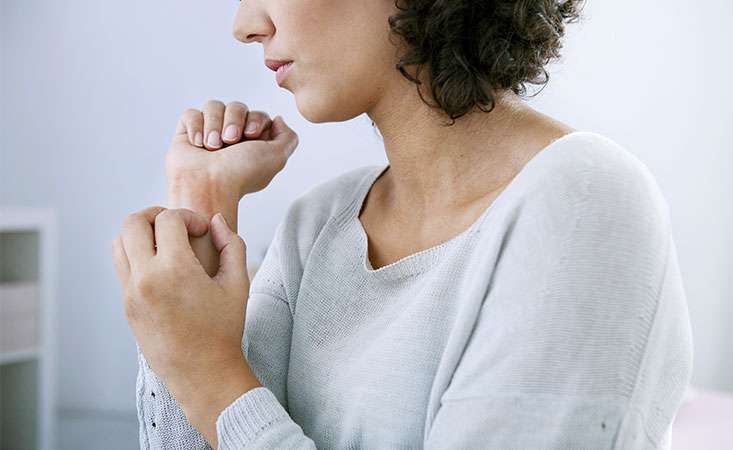
Itchy skin is often caused by everyday culprits like dry skin, allergies and bug bites. But it can also be a sign of certain medical conditions.
It’s important to know that itchy skin, along with other symptoms, can be a sign of pancreatic cancer. And, it’s a potential treatment side effect. Here’s what you need to know about pancreatic cancer-related itching and ways to relieve it.
Itching (with Jaundice) as a Symptom
Itching can be caused by jaundice, a condition that may affect people with pancreatic cancer.
Jaundice causes the skin and eyes to appear yellow due to a buildup of a bilirubin (a component of bile) in the body. Bile is made in the liver and released into the small intestine through a bile duct. Bilirubin builds up when there’s something, like a pancreatic tumor, blocking the liver from releasing the bile. This is called obstructive jaundice.
Other jaundice symptoms include dark urine and light or clay-colored stools. Jaundice can cause itching, but not always. And, not all pancreatic cancer patients will experience jaundice.
Pancreatic cancer may cause only vague unexplained symptoms. Pain (usually in the abdomen or back), weight loss, jaundice (yellowing of the skin and/or eyes) with or without itching, loss of appetite, nausea, change in stool, pancreatitis and recent-onset diabetes are symptoms that may indicate pancreatic cancer. If you are experiencing one or more of these symptoms, the Pancreatic Cancer Action Network (PanCAN) urges you to speak to your doctor immediately and reference pancreatic cancer.
The most common way obstructive jaundice is relieved is by placing a stent. This in turn can help to relieve the itching. Stents are hollow flexible tubes that hold open a passageway, such as a duct, to allow fluids to flow through.
Itching as a Side Effect
Some cancer treatments, like chemotherapies, are known to cause itching as a side effect. Itching may also be a sign of an allergic reaction. If you’re receiving treatment and experiencing itching, talk to your healthcare team as soon as possible. According to ChemoCare, treating itching early will lessen its severity and lead to a faster recovery.
Controlling Itching
Seeing healthcare professionals who focus on symptom management and supportive (palliative) care improves outcomes and is critical for quality of life. PanCAN strongly recommends that symptom management and supportive (palliative) care be provided early in patients’ diagnosis as well as during and after treatment.
If you’re experiencing itching, avoid scratching and seek medical attention. Your doctor may prescribe over-the-counter medicines, like creams (hydrocortisone cream, calamine lotion, etc.), antihistamines (Benadryl, etc.) or corticosteroids.
Other things you can do to relieve itching include:
- Applying cool compresses to the affected areas
- Taking warm showers
- Moisturizing your skin
- Using hypoallergenic laundry detergent
- Wearing cotton clothing, which is gentle on the skin





